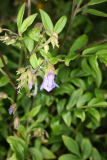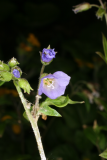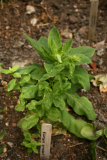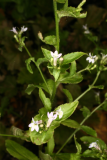Additional notes (click to expand)
Commemorative
The genus was named after Matthias de L’Obel or Lobel (1538–1616), Flemish botanist and physician to James I of England. The family name of L’Obel derives from the French word for the white poplar, ‘aubel’. He was born in Rijsel near Lille in northern France, studied medicine at Leuven (Louvain), where Dodoens studied 20 years previously, and both medicine and botany at Montpelier University (1565– c. 1568), where he was taught by perhaps the most famous teacher of the age, Guillaume Rondelet, regius professor of medicine. Rondelet was so impressed with L’Obel that he gave him all his books. Here L’Obel met Pierre Pena. They came to England in
1569 in the reign of Queen Elizabeth I (1533–1603), and travelled together collecting native plants. When Pena returned to the Continent in 1571 to practise medicine, L’Obel, who had married an Englishwoman, stayed in England for a few months longer. When he returned to the Low Countries (the Netherlands) he practised medicine in Antwerp and then Delft from 1571 to 1581, returning to Antwerp where he became physician to William the Silent, Prince of Orange. After the latter’s assassination in 1584, he returned to England and became superintendent of the garden of Lord Zouche in Hackney. He helped John Gerard publish his herbal (in 1597), an English translation of Dodoens’ herbal, correcting Gerard’s many mistakes and identifying the woodcuts – the majority
of which had been used in the earlier herbals of Fuchs, Mattioli, Dodoens and his own books. In 1606, he became physician and botanist to James I (King of England, 1603–25) and thereafter remained in England, living with his married daughter in Highgate untilhis death.He was buried at the church of St Denis, Highgate, near London.
Oakeley, Dr. Henry. (2012). Doctors in the Medicinal Garden. Plants named after physicians. Royal College of Physicians. page 103
link
Medicinal
Traditional Herbal Medicine Registration (THMR).
Restricted medicinally.
Toxicity
Toxic
Professor Anthony Dayan, 2022
Toxic to humans and pets. Harmful if eaten, a skin irritant.
The Horticultural Trades Association Guide to Potentially Harmful Plants 2022 https://hta.org.uk/poisonousplants
Lobelia inflata L.
Family: CAMPANULACEAEGenus: Lobelia
Species: inflata L.
Common names: Indian Tobacco
Distribution summary: North America
Habit: Biennial
Garden status: Currently grown
Garden location: seed waiting to be sown or germinating in greenhouse or frame (seed)
Reason for growing: Commemorative, medicinal, toxic



